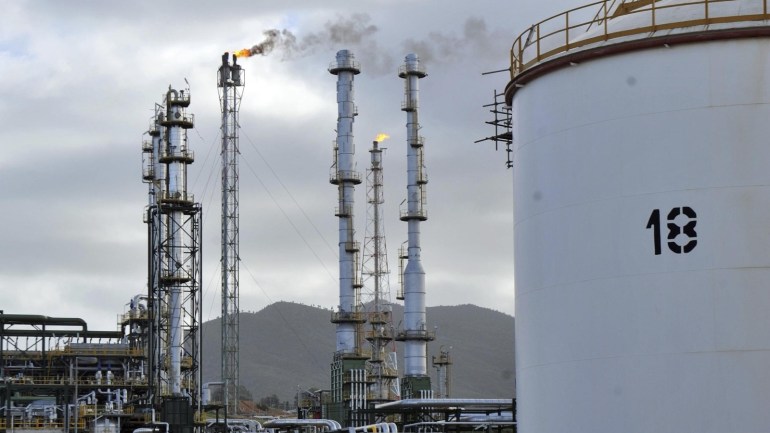Decades of failed policies and reform movements that only avoided dealing with crises are still haunting the Algerian economy, as the dinar hit a new low last week, and experts warn of facing more difficulties in the future.
In a report published by the British Middle East Eye website, writer Yasmina Alloush said that the decline in the value of the Algerian currency continues unabated. Last Thursday, the dinar was traded at 158.76 against the euro, and more than 200 dinars on the black market.
This news did not surprise many economists, who had been warning of reaching this dangerous state of the economy since 2014, when global oil prices began to decline for the first time.
With the outbreak of the Corona virus this year and the unprecedented decline in oil prices, which reached a record level of about $ 16 to $ 17 a barrel last April, the economic problems in the country have moved to a new level.
Algerian Prime Minister Abdelaziz Jarrad sounded the alarm for the first time last March by highlighting the unprecedented "multidimensional crisis" facing the country, whose oil represents more than 90% of its revenues.
As a result, Algeria will be deposited in 2020 while suffering an economic contraction of 5.5%, according to the International Monetary Fund, which also expected the Algerian fiscal deficit to reach 14.8% of GDP in 2021.
Algeria has depleted its foreign currency reserves in the past few years (Al-Jazeera)
Depleted reserves
Algeria has depleted its foreign currency reserves in the past few years, as it has struggled to finance the ballooning deficit, and after foreign currency reserves in 2014 were in the range of $ 200 billion, it is expected that this number will reach $ 44 billion by the new year.
With its reserves running out, the government was forced to devalue the currency, which led to high inflation rates amid mounting austerity, while it tries to balance public accounts.
And the announcement of the resumption of domestic flights from December 5 helped spark the dramatic decline of the dinar against the euro on the black market.
On the other hand, foreign currency dealers expected the euro exchange rate to reach more than 250 dinars once the Algerian borders reopen and commercial activities return to normal, with the possibility that the black market will regulate prices according to the increase in demand and the limited supply.
The increase in illegal immigration from Algeria is another reason for this rise, with the increasing number of young Algerians turning to the black market for their financial transactions in order to finance attempts to migrate to Europe.
Breakdown agents
Although Algeria's oil and gas reserves are expected to be depleted by 2050, the country has repeatedly failed to diversify sources of revenue away from oil.
The writer quoted Dalia Ghanem, a resident scholar at the Carnegie Middle East Center, that "policy makers simply ignore the signals and believe that improving the market situation will save them, which means higher oil prices, and they have been warned for years to move and discuss the diversification issue seriously, but instead, they are," They didn't do anything and they kept stalling. "
Ricardo Fabiani, a political economy analyst at the International Crisis Group, says Algeria's over-reliance on its oil and gas reserves was the root cause of its economic problems.
Other factors that have contributed to the collapse of the free economy include restrictions on the private sector, unaddressed mismanagement, structural problems, and the military's control of business.
The decline in revenues forced the state to halt national projects and cut spending on public services by 50%, threatening the anger of the population, who have consistently demanded an end to the rampant corruption that benefited the country's leaders but left them in a suffocating crisis.
Algeria's excessive dependence on its oil and gas reserves has been the root cause of its economic problems (The Associated Press)
Vested interests
Officials have been arguing for years about how to bring about major economic reforms, but without tangible results. According to Fabiani, “economic reforms to liberalize the economy, strengthen local manufacturing, or open the country to tourism (which will achieve long-term benefits by creating jobs and generating reserves) Foreign), not yet implemented.
Because of its negative experience in borrowing from the International Monetary Fund in the 1990s, the country has consistently refused any solution to its economic crises that might lead to overburdening it with external debt, or forcing it to restructure billions of dollars in foreign loans.
According to observers, one of the few options left for the state is to try to delay the depletion of its oil reserves by reducing production, reducing subsidies on hydrocarbons, and investing better in the private sector in order to encourage entrepreneurs and attract outside investors.
Future difficulties
Compared to its neighbors, foreign investment in Algeria has been much delayed, and Fabiani points out that "the government needs to establish a dialogue forum with the main economic actors in the country, including entrepreneurs, labor unions, civil society groups and students. This dialogue will enable all these actors to formulate a realistic reform strategy of That would introduce much-needed reforms to revive the economy. "
For policymakers working in secret in the country, any change that causes them to lose their financial benefits is a taboo.
According to writer Dalia Ghanem, the task ahead of the country, which is to address the economic situation and avoid a further collapse of the dinar, will be difficult.

